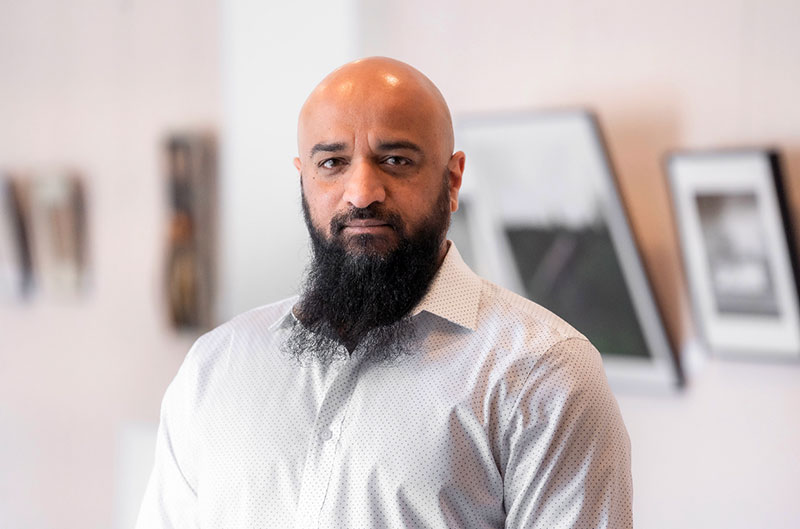AUK Assistant Professor of Economics Completes Research at Harvard University
19th Oct 2020 | by the Department of PR & Marketing
Dr. Khalid Saeed, Assistant Professor of Economics at the American University of Kuwait (AUK) completed his research fellowship at the Center for International Development at Harvard University. The following interview discusses details of his research and his experience at Harvard:
- Give us a brief description about your research at Harvard.
My research at the Center for International Development at Harvard University was on sustainable economic development and models of Structural Transformation for developing countries. The primary goal of my research was to investigate how a robust R&D sector can affect the country’s knowhow and productive capability, and the critical role government can play in achieving sustained increases in total factor productivity. This centralized growth—with emphasis on knowledge-intensive services sector—when applied to Kuwait within an Economic Complexity Framework represents a Strategic Bets Approach for transforming Kuwait’s economy to knowledge-based.
- Why did you choose this topic for your fellowship?
Building the knowledge infrastructure in Kuwait is critical for the country’s sustainable development objectives. In recent years, policymakers in Kuwait have concluded that reliance on oil-exports is non-sustainable for the country’s future. As a result, they have taken initial steps to diversify the country’s export-base and income. Yet, Kuwait still struggles in critical areas necessary for transforming its economy to a knowledge-led economy.
- Who were your collaborators and colleagues in the research?
During my time at Harvard, I had the opportunity to meet and work with some of the world’s leading development economists. At the Growth Lab, in the Center for International Development, I met with Director Ricardo Hausmann who gave me valuable feedback into my research. Professor Hausmann is credited with the development of the Economic Complexity Framework and had previously consulted for the governments of Jordan, Saudi Arabia, and Oman among others in issues related to Fiscal Policy and Structural Transformation. I also collaborated with other economists such as Tim Cheston—Head of the Saudi Arabia project at the Growth Lab, and another team who spent two years in Jordan advising policy makers on Structural Change and Macro policies.
- What was the experience like? Did you find it informative and helpful?
My overall experience was really amazing. The rich intellectual culture around Harvard campus was really impressive and very inspiring. My office was located in the Middle East Initiative (MEI) at the Belfer Center for Science and International Affairs. As a Fellow at MEI, I had the opportunity to attend all internal and external seminars held by the Center and Harvard Kennedy School. I also had the opportunity to meet and discuss my research with other MEI Fellows from other institutions such as Stanford, UCLA, Columbia, and MIT and found areas of mutual interest for future research collaboration.
- Was the research goal achieved and what are the next steps?
My short-term goal for this research was definitely achieved, but this is an ongoing project that I intend to work on for the foreseeable future. Other than journal publications, seminars, and lectures resulting from my research, I plan to introduce my work to my students and incorporate the principles of sustainable economic development for Kuwait and our region into courses I teach.
- How did Covid-19 affect your trip and your research?
Covid-19 definitely presented me with a challenge, at first, but I was able to adjust quickly and make the most of the current situation. Harvard University is located in Cambridge, Massachusetts, just outside of Boston. The Northeast of the United States was especially hard-hit with Covid-19 in the early months of the pandemic. However, Harvard moved all instructions and all other academic and research centers online right after Spring break – we didn’t miss a beat. All lectures, presentations, seminars, etc. were conducted remotely in April and May, and we were able to communicate and collaborate via ZOOM.
- How do you think your research can benefit Kuwait and future generations?
According to recent data for high-income countries, Kuwait ranks among the lowest in Education and Training, and Innovation Systems – two pillars of the Knowledge Economy Framework. Kuwait has also taken some steps to diversify its economy away from natural resources. Kuwait’s Vision 2035, for example, calls for the establishment of the Northern Economic Zone (NEZ); a free-trade zone with the potential of becoming the region’s leading trading hub. My research calls more government involvement in the R&D sector by investing in the country’s most valuable asset—its citizens. My centralized growth approach emphasizes the need for building the knowledge infrastructure necessary for sustainable development and growth. This investment in human capital means greater public sector commitment to STEM and Economic Science education and research—at all levels. It also means new public-private partnerships in order to provide future generations with the tools needed to compete in a knowledge-intensive economy.
- Anything you would like to add about the fellowship/experience?
Yes, I especially would like to thank Dr. Rawda for her support when I was awarded this Fellowship. This opportunity would not have been possible without her leadership and support. I am very excited about the future, and this Harvard Fellowship was only the beginning of what promises to be a very fruitful journey.

Dr. Khalid Saeed, Assistant Professor of Economics at AUK